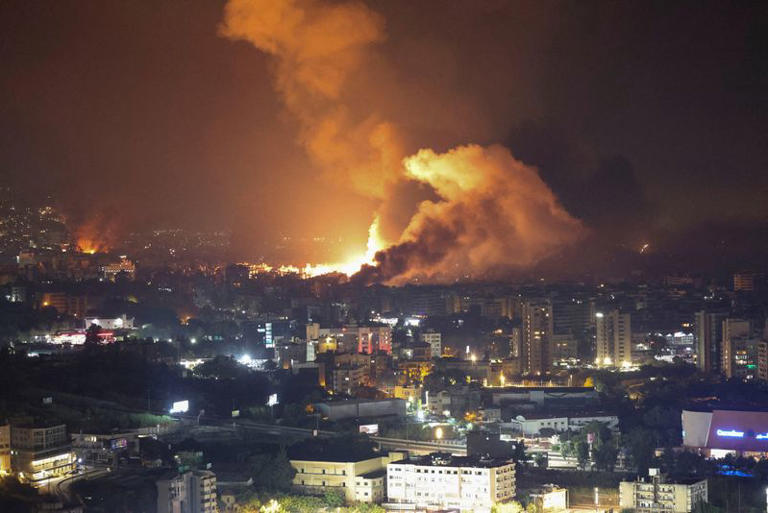

Beirut’s southern suburbs were rocked by a series of airstrikes as Israel intensified its assault on Hezbollah.
Following a significant attack on the Iran-backed group’s command center that seemingly aimed at leader Hassan Nasrallah, witnesses reported over 20 airstrikes before dawn.
In response, thousands of Lebanese fled their homes in the southern suburbs, gathering in public squares, parks, and along the coast in downtown Beirut.
“They want to destroy Dahiye, they want to destroy all of us,” said Sari, a man in his 30s who evacuated after receiving an Israeli evacuation order.
Nearby, newly displaced families in Martyrs Square rolled out mats in an attempt to rest.
The early hours of Saturday saw an unprecedented five-hour barrage, marking the most intense Israeli strikes on Beirut in nearly a year of conflict with Hezbollah.
This escalation has raised alarms about the potential for the conflict to spiral out of control, possibly involving Iran, Hezbollah’s main ally, and the United States.
While there was no immediate confirmation regarding Nasrallah’s status following Friday’s heavy bombardment, a source close to Hezbollah indicated he was unreachable. The Lebanese group has yet to release a statement.
Israel has not confirmed whether Nasrallah was specifically targeted, but a senior Israeli official acknowledged that high-ranking Hezbollah commanders were in the crosshairs.
“I think it’s too early to say… Sometimes they hide the fact when we succeed,” the official stated when asked about the possibility of Nasrallah being killed in the strikes.
Earlier reports from a Hezbollah source suggested that Nasrallah was alive, with Iran’s Tasnim news agency also confirming his safety.
A senior Iranian security official noted that Tehran was investigating his status.
The Israeli military announced the deaths of Muhammad Ali Ismail, the commander of Hezbollah’s missile unit, and his deputy, Hossein Ahmed Ismail, in the attacks.
Before the latest strikes, Israeli Prime Minister Benjamin Netanyahu addressed the United Nations, asserting that Israel had the right to continue its military campaign.
“As long as Hezbollah chooses the path of war, Israel has no choice, and Israel has every right to remove this threat and return our citizens to their homes safely,” he stated.
Netanyahu’s speech saw several delegations walk out, and he later cut his New York trip short to return to Israel.
Lebanese health officials reported six fatalities and 91 injuries from Friday’s initial assault, which was the fourth strike on Hezbollah-controlled areas of Beirut in a week and the most severe since the 2006 war.
EDITORS PICK:
The death toll is expected to rise, with over 700 casualties reported from strikes in the past week.
Hezbollah’s al-Manar television reported that seven buildings were destroyed in the attacks, with security sources indicating the strikes targeted locations where senior Hezbollah officials are typically based.
Shortly after, the Israeli military urged residents in parts of Beirut’s southern suburbs to evacuate as it targeted missile launchers and weapons storage facilities allegedly located within civilian structures.
Hezbollah denied the presence of any arms depots in the struck buildings, as stated by the group’s media office.
Alaa al-Din Saeed, a resident of one of the targeted neighborhoods, shared his experience: “We found out on the television.
There was a huge commotion in the neighborhood.” He and his family packed essential items but found themselves stuck in traffic with others trying to escape.
“We’re going to the mountains. We’ll see how to spend the night – and tomorrow we’ll see what we can do,” he added.
This week alone, around 100,000 people in Lebanon have been displaced, bringing the total number of displaced individuals in the country to over 200,000.
The Israeli government has stated that a key objective of the war is to facilitate the return of approximately 70,000 Israeli evacuees to their homes.
In response, Hezbollah has launched hundreds of rockets and missiles at targets in Israel, including Tel Aviv.
The group reported launching rockets at the northern city of Safed on Friday, resulting in minor injuries to a woman.
So far, Israel’s air defense systems have minimized damage from these attacks.
Iran condemned Friday’s strikes as crossing “red lines” and accused Israel of using U.S.-made “bunker-busting” bombs.
U.S. Defense Secretary Lloyd Austin stated that Washington was not informed of the strike ahead of time, and President Joe Biden was kept updated on the situation.
At the U.N., the escalating conflict drew international concern, including from France, which, alongside the U.S., proposed a 21-day ceasefire.
“This must be brought to an end immediately,” French Ambassador Nicolas de Riviere urged during a Security Council meeting.
U.S. Secretary of State Antony Blinken emphasized the need for diplomacy over conflict, stating, “We believe the way forward is through diplomacy, not conflict… We will continue to work intentionally with all parties to urge them to choose that course.”
The current round of hostilities began when Hezbollah fired a missile barrage at Israel shortly after the October 7 attack by Hamas in Gaza last year, reigniting a long-standing conflict.
CLICK TO WATCH OUR VIDEO OF THE WEEK
Myanmar Declares Week of Mourning As Earthquake Death Toll Surpasses 2,000. Flags to fly at…
Lagos Golden Heart Lions Club made a generous donation of N5 million to the Pediatric…
Gov. Sanwo-Olu was awarded by Broadcasting Talents Nigeria The award was received on behalf of…